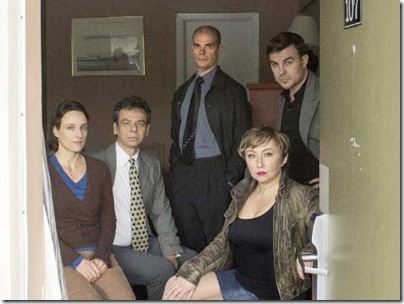The End of Civilisation: An angst-ridden ride
Published on in the Ottawa Citizen on May 18, 2015
Photo Julie Le Gal
Civilization doesn’t actually collapse in George F. Walker’s exceedingly dark, angry and at times very funny The End of Civilization but it gets a damn rough ride.
Part of Walker’s late-1990s Suburban Motel series of plays, the show (this is its Ottawa premiere) finds a middle class couple, the self-absorbed Henry Cape and his weary wife Lily, holed up in a dreary motel. They’re attempting to save money while Henry, the victim of corporate bloodletting, searches dispiritedly for a new job.
Living in the next room is a practical prostitute named Sandy who befriends Lily. Also on board: two police officers, the uptight Max and his smarmy but likeable partner Donny, whose investigation of a series of murders brings them to the Capes’ motel room. There, the two cops squabble as viciously as do the Capes.
To say much more would be to risk spoiling the plot. Suffice to say that, driven to desperation and the limits of civilized behaviour, things don’t go well for any of these folks, least of all for Henry who’s inclined to dive head first into a bottle or Lily who, determined to save the home and children she’s temporarily abandoned, does what she has to do to earn a little money.
David Frisch gives us a surprisingly sympathetic Henry. Self-pitying and oblivious to others as he is, you feel for this guy who at one point says, “If you could see the man I was, you’d be impressed.” Explosive anger, a feeling of emasculation, self-hatred for having been taken in by “the system” and its illusion of security: Frisch’s acting and Walker’s visceral writing make it uncomfortably easy for us to imagine being Henry.
Julie Le Gal as Lily is more hit and miss. While Lily withdraws from herself as a survival strategy, Le Gal too often seems to be acting, not inhabiting, her character. We have little sense of the internal struggle that Lily must have endured to do what she does, and that reduces the show’s tension.
On the other hand, Le Gal is powerful in the closing scene when, like a character in an Edward Hopper painting, she sits in a darkening space contemplating a diminishing future.
Catriona Leger, decked out in high-heeled boots and tight, skimpy dresses, makes for a knowing, multi-dimensional Sandy. No street walker, she works the more civilized bars and escort services to earn enough to support her two children. When Sandy learns that Lily also has two children, her face lights up like a suburban mum discovering common ground with another woman she’s just met in a grocery store lineup.
Geoff McBride is the prickly Max while Brad Long, wearing a dopey but inscrutable grin, is excellent as the perpetually randy Donny (excellent that is except for overdoing a drunken scene). The two cops are no less ground down by civilization’s demands than anyone else: As Donny says to Lily, who he dated once back in high school, “We knew each other when we were still complete human beings.”
Mary Ellis’ direction of this existential bumper car ride is, except for the odd flat spot, true to the rhythms and ferocity of Walker’s writing. She also stickhandles nicely the playwright’s tricky, non-linear timeline that flits back and forth through the chronology, leaving the characters even more isolated from themselves and each other than they already are.
C
